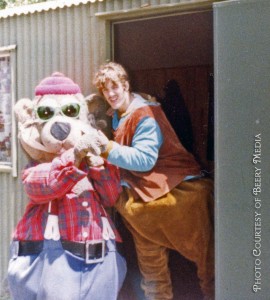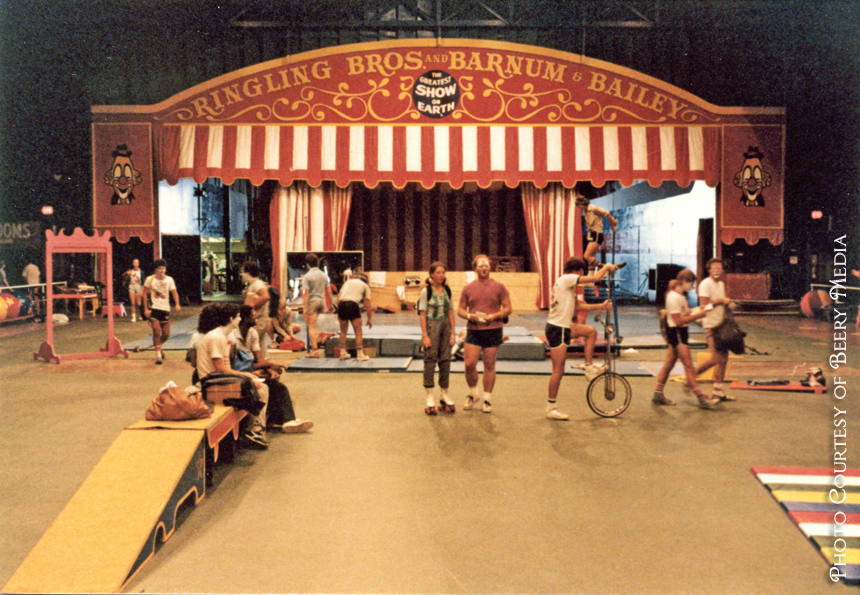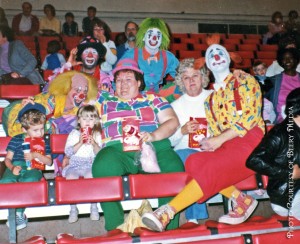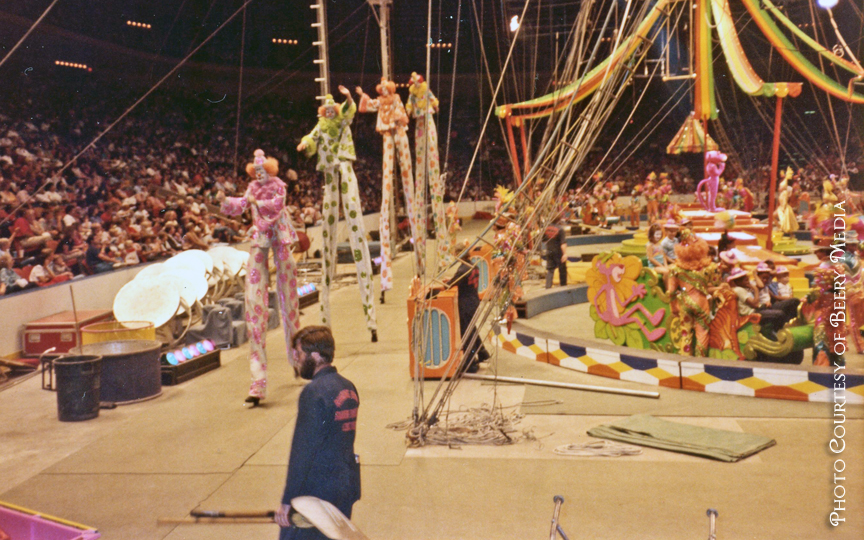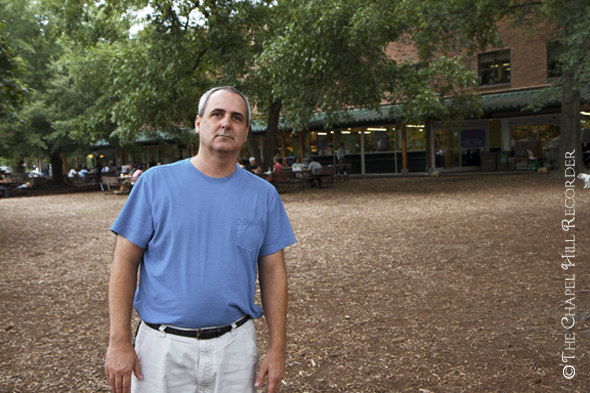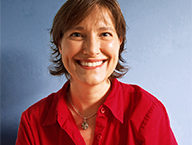Nic Beery
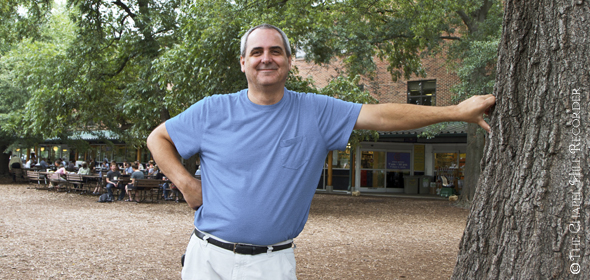 After a lifetime of adventures, Nic Beery, the founder of the Carrboro Film Festival, landed in Carrboro, North Carolina in 2005 by sheer luck. Fortunately for our community, he is here to stay.
After a lifetime of adventures, Nic Beery, the founder of the Carrboro Film Festival, landed in Carrboro, North Carolina in 2005 by sheer luck. Fortunately for our community, he is here to stay.
Nic Beery was born in northern Virginia on June 5, 1963. He grew up in cities all over the nation and internationally as a military brat since his father was in the U.S. Air Force. He attended thirteen different schools during his twelve years of schooling, including three different high schools, which greatly contributed to his outgoing personality. “I was definitely the class clown. I had to be very extroverted because I knew I needed to make friends fast, because I wouldn’t be there long.” Beery also assumed the role as the audio/video expert in schools and was always the one to help his teachers set up slide and movie projectors. He was an average student, and never had any desire to attend college, so never did.
BUSCH GARDENS
Instead, Beery headed straight to Busch Gardens, in Williamsburg, Virginia. “I played costume characters for two summers there. I just went, and did Buford the Beaver, and I was Gordon the Dragon from the story St. George and the Dragon in the England area of the amusement park.” During this time, in the spring of 1982, Beery also auditioned for the Ringling Bros. Barnum and Bailey Circus Clown College. “One day, when I was working at Busch Gardens, I got a call in my trailer backstage between performing from the Dean of Clown College, Ron Severini. He asked me a lot of questions and the only question I really remember was, ‘Why do you want to go to Clown College?’ I knew that in the literature that they had sent me that I would learn how to sew. So I said, “Because I want to learn how to sew.” I didn’t know what else to say. I never grew up wanting to be a circus clown. I wanted to be Robin Williams. I definitely wanted to be Robin Williams, Jerry Lewis, Don Knotts, of course. But I never wanted to be a clown. He paused after I said that, and he said, ‘I need you down here on September 3rd.’ So I went home, after finishing at Busch Gardens, and my parents had moved to Caracas, Venezuela. I had no where to live, so thank God, I got into Clown College!”
CLOWN COLLEGE
Beery attended Clown College in Venice, Florida. It was ten-and-a-half weeks, 6 days a week, from 8:30 am- 10:00 pm. During this intensive boot camp, Beery learned juggling, stilt walking, how to walk on a big globe, unicycle and tiny bicycle riding, and of course gags, from the best clowns in the world. According to Beery, there are only three types of comedy: sex, violence and politics. Wearing drag is the closest that clowns come to doing any routines about sex. Politics has no place in the circus. Therefore, most of the clowning gags he learned were playful, violent, slap-stick physical comedy routines.
CLOWNING AROUND
As soon as he graduated from Clown College in the fall of 1982, Beery took off on tour for two years on what is known as the Red Unit. “I had a wonderful time,” Beery remembers. “I lived on a mile-long train and I made some friends that I have to this day. We traveled in Clown Car #54.” (I had to ask how many clowns were crammed into a clown car, and he said twenty-four!) The “roomettes” on the train were tiny — only about 3′ x 6′ x 8′ tall. Beery said, “The average Ringling clown only lasts about two years before they get burned out. We only got paid $150 a week, and you are not fed. You have to pay for food, laundry and $10 a week to live on the train.”
Most of the gags were part of established clown routines written by the Boss Clowns and all the other clowns together. However, the clowns were encouraged to come up with their own material as well, and if you had an idea for a gag, you auditioned it during what they called Nurnbergs. “The longer you are on the show, the more you start creating your own character, your own gags, your own everything. But I did create my own make-up, designed my own costumes and my own wigs. And I did learn how to sew!”
The water cooler gag was Beery’s favorite. Beery explains the gag: “A friend of mine, a clown and I, we’re thirsty and wanted to go to the water cooler which is a big box on the ground labeled “WATER COOLER” and it has this big plastic top. They open it up and there is a big, puppet frog in there! Whenever they take off the top, the frog squirts my friend Greg Mooney. I laugh, of course, so Mooney gets mad at me and throws me on top of the water cooler. Then all of a sudden, water comes shooting out the top of my head. That’s the gag. I loved that gag!”
After two years on the road, from 1982-84, Beery retired from clowning at the age of 21. However it took a while for him to wean himself away from that institution and give up clowning altogether. He hired himself out for private clowning gigs for another year after he left the circus, and Beery’s entire home was decorated with clown and circus stuff. He found he was thinking about the circus all day long, and dreaming of being in the circus every night. It got to be too much, so he took everything down and packed it all up, where it still sits in a box in his home in Carrboro, North Carolina. “To tell you the truth,” Beery reflects, “I was never really a clown. I was an actor being a clown. There are people that are clowns, and that’s who they are. And I commend them. I was just having fun.” Beery has not donned his clown make-up since 1985, and has no plans to do so in the near future, though he still owns a mini-bicycle and unicycle.
THE NEXT CHAPTER
While Beery was still in the circus, he would be asked to do Ringling Bros. promotional publicity shoots for local television stations, and would later see them on TV. He was amazed at how the final product that was televised was so different from what was actually filmed. Beery remembers thinking, “That’s not really what they videotaped. That’s not the way they videotaped it. I had no idea how TV. was produced. But I kind of liked that. I liked how they put those news stories together. It was Providence, Rhode Island in 1984. I remember it clearly. I said to myself, ‘You know? One day, I think I want to be in television. Maybe behind the scenes.’ So I was actually starting to make the transition from being in front of the audience to wanting to be more of a producer or director.”
 Once Beery retired from clowning in 1985, he pursued a career in television. “In the ensuing years, I began working in cable access, producing infomercials, and with local and international television news stations. I was very fortunate in my climb. Within a few years, I was working in a great company called Mobile Video Services as a cameraman. They were a Service Bureau a block from the White House, so everyone came through there. I worked with Katie Couric, Deborah Norville, Paula Zhan and numerous other journalists at their level.” Through this job, Beery also personally met every President from Gerald Ford to George W. Bush, and numerous leaders from other countries like Benjamin Netanyahu. Beery still goes back every four years to work for this company for each Presidential election, so he hopes to get a chance to meet President Barak Obama.
Once Beery retired from clowning in 1985, he pursued a career in television. “In the ensuing years, I began working in cable access, producing infomercials, and with local and international television news stations. I was very fortunate in my climb. Within a few years, I was working in a great company called Mobile Video Services as a cameraman. They were a Service Bureau a block from the White House, so everyone came through there. I worked with Katie Couric, Deborah Norville, Paula Zhan and numerous other journalists at their level.” Through this job, Beery also personally met every President from Gerald Ford to George W. Bush, and numerous leaders from other countries like Benjamin Netanyahu. Beery still goes back every four years to work for this company for each Presidential election, so he hopes to get a chance to meet President Barak Obama.
After many years participating in the world of television journalism, Beery became disillusioned, and frankly disgusted, with his role as what he calls “being a perpetrator of lies.” “The hardest thing for me when I got into that world, when it got to the end, (and I left during Bush Two in 2005), was when you know that every news story you are reporting is just lies. It got so bad, and I felt like I just couldn’t do it anymore. I was going to explode. I honestly was going to have a mental breakdown. It was like if you said to me, ‘Here’s a gun. Shoot that person.’ And you just can’t do it. It was really that bad.”
FINDING CARRBORO, N.C.
Beery needed a change professionally, and his wife was getting tired of the rat race of living right outside Washington, D.C. in Falls Church, Virginia. “When it took my wife 30 minutes to go half a mile to the grocery store at 7:15 am,” Beery says, “she came home and said, ‘O.K. It’s time to move.'” Like most transplants to the Chapel Hill/Carrboro area, they also wanted a safer and more peaceful environment in which to raise their two children. “Our kids were reaching the age, in upper elementary school, where we were either going to do it now, or not do it. I didn’t want what happened to me to happen to them, and uproot them during high school. Fortunately for the Beery family, in 2005 the home buying and selling market was booming, so selling their home would be easy. The only question left to answer was, “Move where?”
Beery had traveled extensively for the first twenty-one years of his life, so he had visited all the major towns in all the states of the continental U.S. His only visit to North Carolina, however, was when he performed with the circus in the Dorton Arena in Raleigh. Beery’s main memory of that was that the dressing room was downstairs, which meant they had to climb a ladder to get into the arena. Beery laughs when he recalls it. “I was the only guy who could walk stilts at the Dorton Arena, out of the five of us stilt walkers we had, and the only reason I could do it was because I was the only one who had enough time in the act to run all the way downstairs, change costume and climb the ladder back up to the stage in order to do it. It was hilarious. There was never more than one stilt walker at the Dorton Arena shows in Raleigh, and I was it.”
Out of all the great cities in the nation, Beery chose to live in Carrboro, N.C. mostly by chance. “It was 80% luck. The other 20% was my wife Laura saying we had to live within a 3-hour drive from her Mom, who lived in Richmond, Virginia. We didn’t want to go north into Baltimore or west to West Virginia. Looking at a map, Raleigh was exactly three hours south of Richmond, so I decided to come to Raleigh to check it out. I had a cameraman friend who lived in Durham, and he showed me around. I didn’t know Durham, I didn’t know Chapel Hill or Carrboro, and I didn’t know Cary. So I looked at Cary and thought to myself, ‘This is exactly the same as northern Virginia. It’s fine, but I don’t want to live here.’ So my friend said, after talking to me about what I wanted to do — be creative, make my own films — he said, ‘You should try this place called Carrboro.’ So we drove over here, and I thought, ‘Whoa. This is cool.’ Then I brought my wife here a few times to find a house, moved down here, and here we are. My daughter just left for college at UNC-Asheville, and my son is a junior at Carrboro High School. We love it here.”
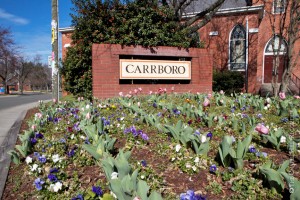 GETTING SETTLED IN C’BORO
GETTING SETTLED IN C’BORO
After moving to Carrboro, North Carolina in 2005, it took a while for Beery to acclimate to the lifestyle one finds down here versus in D.C., and he struggled at first to get his business going. “I find that this town is a unique ecosystem. So, things work differently here. Meaning, when I moved down here, I was living in a fantasy world. I was delusional. I was like, “I’m Nic Beery. I have all this video production background. I’m going to start a business and in a week, I’m going to have all this work. That didn’t happen. I realized that what works in D.C. doesn’t work here. I come down here, and slowly, within a few years, I finally realize, ‘Oh. It’s truly about relationships. It’s not about experience or clout or image, it’s actually who you know.'”
THE CARRBORO FILM FESTIVAL IS BORN
Little by little, Beery was finding the connections he needed to get his business going. “I met several important people here, and one of those people was Jackie Helvey. She’s a dear friend and I really think that she can just pick up the phone, send an email and make things happen. She can and she does. So after I met her, she saw several of my films and liked them, and she said, ‘There should be a place for you to show your films.’ Helvey was part of the Carrboro Arts Committee and she said to me, ‘I just started the Carrboro Film Festival and I want you to be in charge.’ So I said, ‘OK’ because I am good at managing things. I manage my own business. Also, in my career, I produced many live events at hotels and award shows, so I knew what it takes to do something like this. It was very easy for me to say, ‘I need a projector, a screen, and a sound system.’ So I said, ‘Sure. I think that would be great!’ And then she said, ‘You could show your films there,’ and I immediately said, ‘No. Your idea is awesome, but no. Why don’t we show off other people’s films? It sounds kind of weird for me to be in charge of the Film Festival and we’re just going to show Nic films.'”
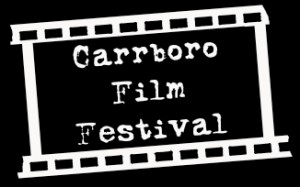 So for the first few years, we didn’t let anybody on the committee show their own films.” But then we realized that we were attracting film-makers to the festival committee, and they shouldn’t be penalized. So they can submit films but they cannot be up for awards and they cannot judge their own films, and they have to accept what the rest of the seventeen-person committee says about their film. Which means I’ve had films not accepted, and I don’t judge it and if they don’t like it, there are no hard feelings. Films are subjective, just like any art. If you don’t like it, that’s cool. That’s fine. The other folks who are filmmakers on our committee, they have no sway. I’ve been around a lot of festivals, and it’s the most democratic process of judging that I’ve ever seen. We keep it so transparent. We don’t want people to think it’s the Nic Festival or the committee gets special treatment. This year, I’m not even going to make final decisions. I’m not even going to be on the committee that makes the final choices of the films. So it’s everybody but me. I will watch the films and I will rate them — we have a numeric rating system. We will probably end up having fifty films that we love as a committee, and everyone will have their favorites and will fight for them. But I’ve decided this year, I’m not going to be part of the final say. And for the past two years, I have not been part of the final say in who wins awards because I don’t believe in them. The only time I will step in is if we have 3 or 4 films that are thematically exactly the same, where we have to go, ‘You know, those are great films, but can we really have three films about Weaver Street?’ Honestly, we can’t, because time is so limited in the festival.”
So for the first few years, we didn’t let anybody on the committee show their own films.” But then we realized that we were attracting film-makers to the festival committee, and they shouldn’t be penalized. So they can submit films but they cannot be up for awards and they cannot judge their own films, and they have to accept what the rest of the seventeen-person committee says about their film. Which means I’ve had films not accepted, and I don’t judge it and if they don’t like it, there are no hard feelings. Films are subjective, just like any art. If you don’t like it, that’s cool. That’s fine. The other folks who are filmmakers on our committee, they have no sway. I’ve been around a lot of festivals, and it’s the most democratic process of judging that I’ve ever seen. We keep it so transparent. We don’t want people to think it’s the Nic Festival or the committee gets special treatment. This year, I’m not even going to make final decisions. I’m not even going to be on the committee that makes the final choices of the films. So it’s everybody but me. I will watch the films and I will rate them — we have a numeric rating system. We will probably end up having fifty films that we love as a committee, and everyone will have their favorites and will fight for them. But I’ve decided this year, I’m not going to be part of the final say. And for the past two years, I have not been part of the final say in who wins awards because I don’t believe in them. The only time I will step in is if we have 3 or 4 films that are thematically exactly the same, where we have to go, ‘You know, those are great films, but can we really have three films about Weaver Street?’ Honestly, we can’t, because time is so limited in the festival.”
On average, only about 27 films are selected to be shown in one day. They have to be 20 minutes or less and most of them are 10 minutes or less. It’s a roller coaster of documentaries, comedies, music videos, dramas, love stories, and animations, all shot with anything from cell phone cameras to professional video equipment. “Part of what I really love doing as a person, is helping and promoting other filmmakers,” says Beery. “And this audience in Carrboro is unbelievable. 300-400 people in the Carrboro Century Center, cheering, laughing, and crying. My films have been in over 60 film festivals, from Cannes to New York City. I have never been in an audience as large as the audience that is in attendance for the Carrboro Film Festival. I’ve been at big festivals and there have been seventy, maybe a hundred people in the audience for each film. But never 300-400 like in Carrboro. Nobody else gets that audience, and we’ve had that audience since the beginning. So, if I can be that guy that shines that spotlight on all these wonderful filmmakers, where every single one of them is doing it as a labor of love, I’ll do it.”
Beery notes, “As creatively-driven as Carrboro is, this town needed its own film festival. Everyone was saying, ‘What took so long? Why didn’t we think of this before?’ In a way, I guess it’s because I didn’t live here then. I hadn’t met Jackie and that whole spark didn’t happen. I was part of that spark, which makes me feel great. Wow. I love the community here, and if I can give back in a productive way, where I can use my talents, this is it.”
FILM FESTIVAL FUN
 As it turns out, Beery is a natural at producing film festivals, and he has since been involved with several other local film festivals and has become an integral part of our filmmaker community. Since 2007, Beery has been the Volunteer Coordinator of the Full Frame Documentary Film Festival in Durham, North Carolina. He searches to fill 400 volunteer positions for the festival in all different categories, from party servers to ushers to ticket takers to drivers and he also hires music. “I love it! I absolutely love it!” Beery exclaims. Two years ago, Beery helped to create another film festival called Blue Sky International Film Festival which was shown at the Lumina in Southern Village, Chapel Hill, North Carolina. “I wanted to have an additional film festival in the area that would highlight films from around the world where those filmmakers would come here and mingle with people making films here. It was a great success.”
As it turns out, Beery is a natural at producing film festivals, and he has since been involved with several other local film festivals and has become an integral part of our filmmaker community. Since 2007, Beery has been the Volunteer Coordinator of the Full Frame Documentary Film Festival in Durham, North Carolina. He searches to fill 400 volunteer positions for the festival in all different categories, from party servers to ushers to ticket takers to drivers and he also hires music. “I love it! I absolutely love it!” Beery exclaims. Two years ago, Beery helped to create another film festival called Blue Sky International Film Festival which was shown at the Lumina in Southern Village, Chapel Hill, North Carolina. “I wanted to have an additional film festival in the area that would highlight films from around the world where those filmmakers would come here and mingle with people making films here. It was a great success.”
Additionally, every summer he teaches film-making to at-risk high school students. The School of Doc is a program that was developed in collaboration with the Full Frame Festival and Duke University. Beery explains, “They visit Durham Schools to find ten kids that probably would benefit by being exposed to documentary film-making. It’s five weeks in the summer at the Emily K Center. The kids start out knowing very little, and we teach them everything about professional film-making. In the last two weeks, they shoot and produce their own documentary film.” It is strikingly similar to the intense Clown College boot camp Beery attended thirty years ago, but this time around, it is all about movie-making. This year, the students did a documentary about Pelican’s Snoballs, a store that makes snocones called Snoballs — yes, there is a difference. And they helped Beery with his new documentary about Noah Powell. Beery beams when he talks about these amazing kids. “I am always so proud of the kids. They are awesome! Their work will be shown at the Full Frame Festival next year. They get their own block at the festival, which is so great because I can’t even get into Full Frame, it is so prestigious.”
If Beery had his way, there would be a different film festival every month in Carrboro. “I wish there were more festivals. I wish there were more places to show films. If I can get the ArtsCenter and the Cat’s Cradle to play films all the time, and if I could get the Flicker Monthly Film Series by Jessye McDowell and the Hi, Mom Annual Film Festival that was run by Matt Hedt going again in Carrboro, I would.”
FINALLY HOME
Beery is so thankful he and his family decided to relocate to Carrboro, North Carolina. “It’s wonderful. My favorite thing to do in Carrboro is walk up through the old mill houses. Every morning, I drive half a mile and park behind the old rundown Tryon Building, and my rat terrier dog Maggie and I walk around town for an hour. I feel at home here, and I’ve never felt at home anywhere else.”
UPCOMING PROJECTS
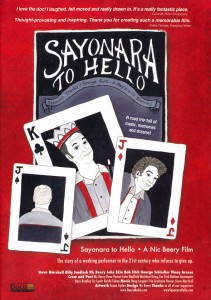 Nic Beery is extremely prolific and always has a project in the works. He just released his first full-length feature film entitled Sayonara to Hello which documents a touring magician trying to make ends meet. He is also in the process of writing a feature film entitled My Dumb Face about a 30-something woman who is brilliant yet her life is in shambles. Additionally, Beery is currently finishing up a short film entitled Character Face that he shot in April of 2012 at the arena where he attended Clown College, for the 30th Anniversary of his Clown College. The arena now is abandoned and condemned since Ringling left it in the early 1990’s. “I went back and made this magical fantasy film that will be released on November 20, 2012, online for free for everybody to see. It’s eight minutes long, and it has three clowns in it that I pulled together, which is great.” You can now watch this amazing short film, Character Face, by clicking here!
Nic Beery is extremely prolific and always has a project in the works. He just released his first full-length feature film entitled Sayonara to Hello which documents a touring magician trying to make ends meet. He is also in the process of writing a feature film entitled My Dumb Face about a 30-something woman who is brilliant yet her life is in shambles. Additionally, Beery is currently finishing up a short film entitled Character Face that he shot in April of 2012 at the arena where he attended Clown College, for the 30th Anniversary of his Clown College. The arena now is abandoned and condemned since Ringling left it in the early 1990’s. “I went back and made this magical fantasy film that will be released on November 20, 2012, online for free for everybody to see. It’s eight minutes long, and it has three clowns in it that I pulled together, which is great.” You can now watch this amazing short film, Character Face, by clicking here!
For more information about Nic Beery and his films, visit his web site: www.beerymedia.com
For more information about Beery’s latest release Sayonara to Hello, read The Chapel Hill Recorder article: “Sayonara to Hello”
The 7th Annual Carrboro Film Festival is November 18, 2012, and the deadline for submissions is September 30, 2012. For more information about The Carrboro Film Festival and how to submit your film, read The Chapel Hill Recorder article: “Carrboro Film Festival” or visit their web site: www.carrborofilmfestival.com.
Category: People

